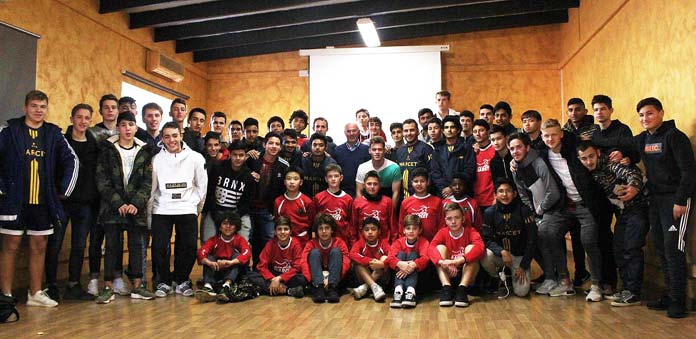This website uses cookies so that we can provide you with the best user experience possible. Cookie information is stored in your browser and performs functions such as recognising you when you return to our website and helping our team to understand which sections of the website you find most interesting and useful.
‘It’s fantastic to see that Academies like this exist’
{mb_sdlf_jugador_SDLF-jugador_frase-destacada}Eriksson visits Marcet’s facilities and gives the Professional Programme scholars advice on their future career.
Sven-Göran Eriksson knows a thing to two about success in football. A clear example being his relationship with SS Lazio, a second rate Italian team which rose to the top in the 1999-2000 season, when they celebrated with a historical ‘Scudetto’. No one is better suited to the High Performance Academy scholars than the Swedish manager for a push in the right direction. And that he did, in an interesting talk with the boys coursing the Professional Programme.
“It should be obvious that dedicating oneself to football means sacrifice”, said Eriksson. “You have to behave like professionals in every sense of the word. You have to work hard. If you don’t train, if you’re lazy, if you’re not a good person and you don’t know how to function in a group dynamic your career will be short lived. But if you work hard, if you try your very best and come to terms with the system, then you might have a chance at success”.
Few people in the footballing world get a chance to accumulate so much experience, internationally speaking. At sixty-nine years of age, the Swedish manager’s CV goes much further than Lazio’s golden era. He spent years sat on the benches of clubs like SL Benfica, AS Roma, ACF Fiorentina, UC Sampdoria, Leicester CFC and Manchester City FC. Not to mention international teams like England, Mexico and Ivory Coast as well as having experience in China and Saudi Arabia. His name has also been mentioned for future collaboration with Australia in the Russian World Cup.

What brought him to Barcelona? His son Alcides, for whom he was looking for a football school with a comprehensive training program. Eriksson visited various training centres around Europe and opted for Marcet. “It’s great to see an Academy like this one. When I was young, there was nothing like it. All the kids have the same dream: they want to play football, be professionals, be successful… It’s a good kind of education, even if you don’t actually end up making it to the top, because whilst you’re here, you’re learning a lot of skills that keep you far from other aspects of society that aren’t as positive”.
Responding to an inquiry about the evolution of football in the past few decades, Eriksson underlines that today in age, footballers need to be skilled across the board and all-rounded technically. “The biggest difference is, way back when, if you were a defender, you had to know how to defend. If you were a striker, you needed to know how to score. Nowadays, there are ten players on the pitch defending and striking simultaneously. Both phases of the game need to be played by everyone. That is the future”.
.
.

